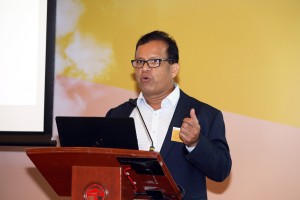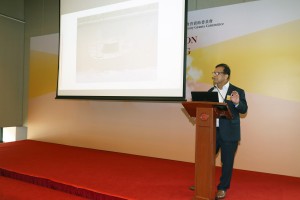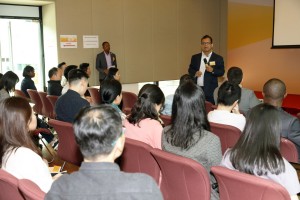Lingnan’s postgraduate conference encouraged students to learn from a range of disciplines
Today’s students must be team players capable of viewing the world around them from a global perspective. To achieve this, educational institutions around the world are embracing multi-disciplinary studies and fostering an international outlook. Students are encouraged to learn from disciplines outside of their main field of study, so they can broaden the range of their knowledge, and ready themselves for the erratic, unpredictable, and ever-changing global marketplace.
The 2019 Postgraduate Conference for Interdisciplinary Learning, which took place March 29 to 30 at Lingnan University’s Leung Fong Oi Wan art gallery in Hong Kong, offered a multidisciplinary platform for students to hone their research and presentation skills. The event, which was subtitled Positioning the Young Scholar for Academic Excellence, encouraged students to reflect on different approaches to conducting cross-disciplinary and comparative research.
At the event, faculty members from different departments at Lingnan University met with students and discussed new perspectives on their research. Students learned about interdisciplinary research, comparative research perspectives, and gained international perspective on the nature of research. The focus was on social sciences, arts and humanities, and business, Lingnan University’s three core faculties.
Keynote speakers included Professor M. Ramesh, the UNESCO chair on social policy design in Asia at the Lee Kuan Yew School of Public Policy, the National University of Singapore, and Dr. Lisa Lucas, co-director of the Centre for Knowledge, Culture and Society, at University of Bristol in the UK. Professor Ramesh talked about governance tools in healthcare, and Dr Lucas addressed rankings, research assessment and researchers in a global context. Dr Antonios Roumpakis, deputy director of the Graduate School the University of York, delivered a keynote on the topic of family as a socio-economic actor.
“We are all doing research and scholarship, and the most important thing for us is to create a learning environment to enable our young scholars to do even better research,” said Professor Joshua Mok, vice-president of Lingnan University, in his opening remarks. “The comparative and international dimensions will be very important. So today I am very happy to have three keynote speakers joining the event from different parts of the world to share their very rich knowledge of comparative and international research in their respective disciplines,” said Professor Mok.
“Hong Kong is an international city, and we keep on asking ourselves what kind of learning experience we should prepare for our students. At Lingnan University, we want to encourage international learning and helping our students to think beyond their research topic to form comparative and international perspectives. We are preparing our young academic scholars for excellence,” Professor Mok said.
Keynote speaker Professor Ramesh introduced himself as “Someone who wears different hats, and most of those hats have something to do with public policy and health policy, sometimes pensions, and sometimes education.” Professor Ramesh noted that he usually kept his “hats” separate.
The professor’s keynote was called “Governance tools in healthcare: insights from China and Singapore,” and focused on the way that policymaking in Asia is divided between the design of policies and the implementation of policies. Policies are only successful if they are implemented correctly and effectively, but all too often, the policymakers have little knowledge of, and interest in, the implementation stage. This can mean that the implementation fails, or even that the policy does not become implemented at all.
For a policy to be implemented successfully, thinkers and doers have to act in concert, the professor said. Problems arise if the planners who are “doing the thinking” have no connection with “those who are doing.” The situation is further exacerbated if those who are implementing the policy do so without thinking. “Doing and thinking should be done together,” Professor Ramesh noted.
Professor Ramesh used the visual metaphor of a drain in a road surrounded by a pool of water to illustrate his point. “This [drain] is not doing its job,” he noted. “The policymakers made a decision, the funds were supplied, the personnel were hired [to build the drain]. But the drain doesn’t do its job.” Yet the dysfunctional drain is already more successful than most public policies, Professor Ramesh noted, as it had actually been built. Many public policies are simply abandoned, he said. “Some drains might not even get built, so there may not even be a chance for them not to work,” said Professor Ramesh.
Interdisciplinary thinking can ensure that problems like the above do not arise, Professor Ramesh noted. “You really need interdisciplinary thinking. My background is in political science, and I meet politicians frequently. Colleagues always emphasise the economics of a project over all the other aspects. But we really need different modes of inquiry to be applied to a problem,” Professor Ramesh said.
Professor Ramesh added that to increase the chances of the successful implementation of public policy, the economics of the project should be left to the end -- after all the other problems have been solved with the help of interdisciplinary thought.




